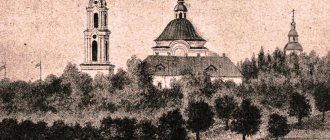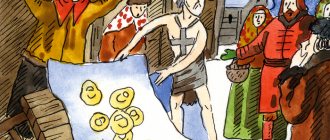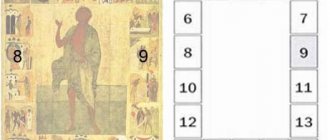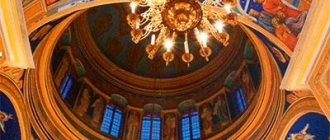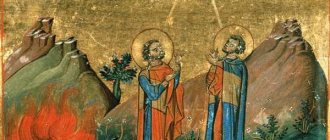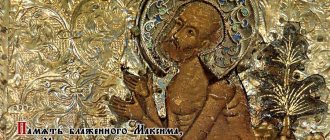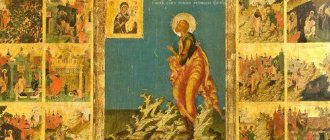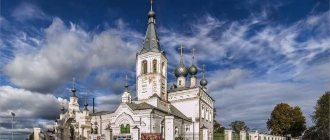| St. Theophilus Kitaevsky, Fool for Christ's sake. Icon |
Theophilus (Gorenkovsky), Kitaevsky, Kievsky
(1788 - 1853), hieroschemamonk, holy fool for Christ's sake, reverend Memory October 28, July 14 on the day of glorification in 1993 (Ukr.) and in the Cathedrals of Vinnitsa and Kiev saints
In the world, Foma Andreevich Gorenkovsky, was born in 1788 into the family of a priest in the city of Makhnov, Kyiv province. His mother did not love him, and since childhood he wandered. By the age of seven he was left an orphan, but, under the care of the Church, he was enrolled in the primary classes of the Kiev-Mohyla Academy.
In 1810, from the academy he was sent to the post of deacon in the city of Chigirin, but due to insufficient vocal abilities, he was transferred from there as a sexton to Obukhov.
Two years later he returned to Kyiv and became a novice at the Bratsky Monastery.
On December 11, 1821, he took monastic vows, receiving the monastic name Theodoret.
Over time, he became the housekeeper of the Bratsky Monastery. But with his soul he desired desert life and asked to be released to the village of Lesniki near Kiev, where, according to legend, the Monk Theodosius of Pechersk spent his fasting time. However, he was denied such a seclusion, and then he decided on a particularly difficult asceticism - the feat of foolishness for the sake of Christ.
On December 9, 1834, he accepted the schema and was named Theophilus.
According to the memoirs of contemporaries, the academic leadership did not accept the “ dirty, ragged monk Theophilos
“, but pilgrims went to him every day and deeply revered the elder, famous for his prophecies.
From 1849 until the day of his death, Hieroschemamonk Theophilus spent in the Kitaevskaya Hermitage.
| Blzh. Theophilus of Kyiv, Fool for Christ's sake. Icon at the relics of a saint |
Died on October 28, 1853.
Many healings took place after the death of the elder, “ for many sick and sick people, for whom human help was powerless, were enlightened in dreams, resorting to the prayer of Blessed Theophilus and, by their faith, were honored to receive healing
».
To the famous prophecies of St. Theophilus includes predictions of the founding of the Intercession Convent in Kyiv, the Transfiguration Hermitage of the Kiev Pechersk Lavra and the Holy Trinity Monastery of Jonah.
On July 27, 1993, he was canonized by the decision of the Holy Synod of the Ukrainian Orthodox Church. The relics of the saint were open for veneration and were constantly located in the Holy Trinity Cathedral of the Kitaevskaya Hermitage.
On February 24, 2009, the relics of the saint were transferred from the Trinity Church of the Kitaevskaya Hermitage to the Church of the Twelve Apostles.
On April 1, 2015, by decision of the Holy Synod of the Ukrainian Orthodox Church, his name was included in the newly formed Cathedral of Vinnytsia Saints [1].
By the determination of the Council of Bishops of the Russian Orthodox Church on February 2-3, 2016, the name of the Venerable Christ for the sake of the holy fool Theophilus of Kyiv was included in the month book of the Russian Orthodox Church for church-wide veneration [2].
Prayers
| Blzh. Theophilus of Kyiv, Fool for Christ's sake. Icon |
Troparion, tone 4
From your youth you loved Christ, blessed Theophilus,/ and you ardently desired to work for Him alone,/ through unceasing prayer and foolishness you labored in the desert of China,/ to please imitating anyone from Pechersk./ For this reason we cry out to you:/ save us with your prayers,/ / Reverend Our Father.
Troparion, tone 8
You have enlightened your soul with fasting, / with unceasing prayers you have made your heart a vessel of the Holy Spirit, / like our Father Theophilus, / even so, all the enemies of the militia have been strengthened how you have put him to shame/ and how you, a true victor, have received reward from Christ God.// Therefore pray for our souls .
Troparion, tone 4
(from the Service used in the Chinese desert)
Having acquired the likeness of Christ, / you did not have where to bow your head, / and with the violence of your life / you put to shame the wisdom of this age, / lifting up your spirit into the heavens, / Theophilus, most blessed, / they say and about us, ascetic of Kitaev./ may we find Divine mercy/ / and the salvation of our souls.
Kontakion, tone 4
You came from the vain world/ and you dwelt in the wilds of Kitaev,/ like our Father Theophilus./ By your incessant psalmody and your foolishness/ you guided many on the path of salvation ./ For this reason we cry out to you: pray to Christ God that he may save our souls.
Kontakion, voice 3
(from the Service used in the Chinese desert)
You were chosen, Father Theophilus, for the feat of foolishness for Christ’s sake, / to expose the sins of mankind / by the violence of your life / and by desecration of a world contrary to God. / By this way of exposing many to Christ You have brought, / in repentance calling: / have mercy on us, O God, // and your saint through prayers is part of those saved.
Venerable Theophilus of Athos the Myrrh-Streaming
Venerable Theophilus the Myrrh-Streaming, commemorated on July 21
Our Reverend Father Theophilus, i.e. “loving God”, was born in the town of Ziki, located in Macedonia, from pious and virtuous parents, and therefore received a truly Christian upbringing. When he came of age, he was sent to school for primary education, and then he devoted himself to higher sciences.
With innate abilities of the mind, he completed his external education in a short time, but with the success of external philosophy, he especially tried to educate the heart in the rules of strict Christian morality: his favorite pastime was, avoiding youthful conversations, most often disorderly, to enter into communication with elders and virtuous men . In addition, he devoted most of his time to reading the Divine Scriptures, according to the commandment of the wise Sirach, who says: “Let your meditation be with those who understand, and all your story be in the law of the Most High” (9:20).
The consequence of this was that the pious young man, succeeding in various deeds of virtue, was, in the words of Saint David, “like a tree by springs of water, yielding its fruit in season” (Ps. 1:3). Reading the Divine Scripture and the lives of saints and pious men involuntarily disposed him to imitate them as much as possible: thus, he imitated Abraham in hospitality, the beautiful Joseph in chastity, Job in patience and courage, Moses and David in meekness, and other righteous people in various exploits. And this very thing drew general attention to him, so that finally, as an example of a virtuous life, he was elevated to the degree of priesthood.
From that time on, he went around different places, edifying Christians with the word and example of his life; Subsequently, for the edification of his soul, he himself clung to the Bishop of Randinia, Acacius, and remained with him. This bishop was ordained to this rank by Patriarch Niphon of Constantinople and was his most sincere friend. At that time, the most holy Patriarch Niphon received letters from Egypt, in which he was informed about the great glorious miracles revealed by God through the then holy Patriarch of Alexandria Joachim in shame and shame of the deicide Jewish race, in praise and confirmation of the Orthodox and true faith of us and all of us Christian.
The miracles were as follows. A terrible plague raged throughout Egypt. One of the Jewish doctors, an avowed enemy of Christians, spread a rumor among the Turks everywhere that the misfortune that befell them was caused by Christians, for Christians, the Jew explained to them, put the cross into the water, which became the cause of this mortal disease. This slander against Christians spread everywhere, so that it finally became known to the Egyptian Sultan. Although the Sultan was a Muslim, he greatly loved and revered the holy patriarch, both for his virtue and for his wisdom and prudence, and therefore he ignored the report of the enemies of the cross of Christ against Christians.
The accursed Jew, seeing that he had not achieved his goal with such slander, invented a new plot against Christians. The Supreme Vizier was a natural Jew. The Jewish doctor chose this favorite of the Tsarev as an instrument of his malice against Christians. The Vizier managed to bring the Sultan to the point that he, despite his respect for the Patriarch, demanded him to the Divan for personal explanations of the slander against Christians. The Patriarch appeared at the trial. The Sultan first had a long conversation with him about faith and finally, seeing that with strong conviction and clear evidence he had justified the Christian faith and disparaged Islamism, he ordered him, in order to justify the words of the Gospel, to move the mountain neighboring Cairo.
His Holiness the Patriarch did not waver in the spirit of faith. Having asked for several days for prayer, he and the faithful Christians, with fasting, vigil and prayers, propitiated the Lord and asked that he not disgrace them in the sight of the infidels and that they not blaspheme His holy name. At the appointed time, with a gathering of many people, the patriarch, in the name of Christ, told the mountain to move from its place and move to another: the mountain shook at its foundation and left its place. Finally stopped by the same name of Christ, it is still called in Turkish Dur-Dago, Stan-mountain. This miracle amazed the wicked.
Not knowing how to shake the power of Christ’s faith, its enemies prepared a deadly poison and convinced the king to command the patriarch to drink it, for Christ, they said, said in the Gospel: “Even if they drink death, do not harm them” (Mark 16 :18). The Sultan accepted this too and ordered poison to be served to the patriarch. Full of faith in the power of the cross of Christ, the patriarch crossed the death cup and drank what was served. It was in vain that they expected him to die immediately: the patriarch remained completely unharmed . After this, having rinsed the glass with water, he asked the Jew to drink it: it was impossible to refuse, because the Sultan himself demanded it. So he drank the water and died at that very moment. Amazed by such miracles, the Sultan ordered the vizier to be beheaded, and imposed a fine on other Jews so that water pipes from the Nile into Cairo would be built at their expense, and he honored the holy patriarch.
When Patriarch Niphon in Constantinople learned about these wondrous events from letters, he immediately sent Bishop Acacius of Randinia, about whom was mentioned above, to Alexandria with the Monk Theophilus and others, so that they would learn in detail and verify with their own eyes what had happened. At the same time, Saint Niphon wrote to Patriarch Joachim of Alexandria, thanking the Lord that He had heard his prayer and through him performed such miracles for the glory and greatness of the Christian race, and then asked to favorably accept the people sent from him.
So, they immediately went to Alexandria and were received with great joy and favor by the most holy patriarch, who kept them with him for a considerable time. The Monk Theophilus attracted his special attention with his virtue and education. From Alexandria, with Bishop Akakios and others, he went to Mount Sinai, and from there through the desert to the holy city of Jerusalem. There they worshiped the life-receiving tomb of our Lord Jesus Christ and other holy places, and visited Mount Tabor and Damascus. Here they met the Patriarch of Antioch, from whom they were given letters to the Patriarch of Constantinople. From Damascus they returned again to Jerusalem, where Bishop Akakios fell ill and died.
After the death of Akakios, encouraged by the blessing of the Patriarch of Jerusalem, with letters to be delivered to the Patriarch of Constantinople, they returned to Constantinople and introduced themselves to the then most holy Patriarch Pachomius, the former Metropolitan of Sichniya, because the holy Patriarch Niphon, who sent them with these instructions, left the department during their wanderings. Patriarch Pachomius received them with honor and blessed the labors they undertook during the journey; in Saint Theophilus he saw a virtuous and learned man, kept him with him and entrusted him with the written affairs of the patriarchate, with the post of notary and exarch of the great Church.
Theophilus carried out these duties for quite a long time and was respected by everyone for his virtues. But seeing and feeling that, despite the contentment of external life and the respect shown to him, there was no or little essential food for the spirit, he left his position and retired to the Holy Mountain, to the Vatopedi monastery.
So that without elder guidance in monastic life, with the wisdom of his own heart, he would not fall into error and delusion, he entrusted himself to the bishop who was at that time retired in the Vatopedi monastery and unconditionally subordinated his will to him, fulfilling all kinds of obedience and every day offering bloodless food to the Lord God. sacrifice. And when the elder bishop departed to the Lord, the Monk Theophilus retired to the Iveron monastery with the goal of finding role models there too.
Thus, he learned from one person perfect obedience, from another - humility, from another - love for God and neighbor, meekness and patience. As a result of this, Theophilus became a chosen vessel of the Holy Spirit and an example of monastic virtues. Meanwhile, on behalf of the monastery, as a red-letter writer, he had as his cell occupation the copying of books that had become dilapidated from longevity. Of these books, many are kept in the library of the Iversky Monastery to this day.
And since, according to the word of the Lord, “a city cannot hide on top of a standing mountain” (Matthew 5:14), then the Monk Theophilus became famous for his virtuous life not only in the Holy Mountain, but also in the surrounding distant places; so Thessaloniki, which at that time had lost its archpastor, tried hard to convince Saint Theophilus to accept the episcopal dignity. But the humble Theophilus did not want to hear about it. Meanwhile, Patriarch Theoliptus of Constantinople happened to be in Thessalonica at that time: the Thessalonians turned to him with a petition to grant them the Athos hermit Theophilos as archpastor. His Holiness the Patriarch, for his part, took part in them and wrote a handwritten letter to Theophilus (for he had previously been very friendly with Saint Theophilus, like his compatriot), asking him to go to Thessaloniki for a meeting and not mentioning a word about the petition of the Thessalonians.
The monk understood the purpose for which the holy patriarch was inviting him to Thessalonica, and therefore, in order to evade such a high dignity and thereby avoid temporary glory and veneration, he immediately accepted the great schema; He answered the holy patriarch that a serious illness forced him to accept the great schema and renounce priestly service, and that due to illness he could not, under any circumstances, come to Thessaloniki at his request. Thus, apologizing for the impossibility of meeting with the holy patriarch here, he asked him for forgiveness and prayers and promised that, by the grace of the Lord, he would see him in the Kingdom of Heaven. Such an answer, on the one hand, saddened the holy patriarch, and on the other, made him happy that Theophilus was so successful in true humility and monastic deeds.
Near the Iverskaya monastery, an abbot named Dionysius then labored in solitude. Loving silence, the Monk Theophilus, with the permission of the abbot and brethren, built a small kaliva near the abbot Dionysius and shared with him the labors of deep hermitage, edified by the example of his lofty life and his wise conversations. Their mutual love was so close that it seemed that one soul lived in them.
At this time, someone who lived on Karya, Kirill, became famous for his ascetic life. In order to receive spiritual benefit from him and imitate his life, Saint Theophilus left his silence and moved to Karea, to Cyril. When the monk was with him, Elder Seraphim, who was Cyril’s confessor, often came to them to serve on the Holy Mountain. Prot drew attention to Theophilus, loved him for his holy life, and from that time, even until death, Theophilus and prot remained sincere friends with each other.
But the divine Theophilus did not remain long on Kareya. A strong desire for silence drew him into the confines of the Pantocrator, into the cell of St. Basil, which had all the conditions of deep solitude and imperturbable silence of silence. The cell required amendments, and Saint Theophilus, not having any contribution, could neither pay the agreed price for it to the monastery, nor update it: to such an extent he had adopted monastic non-covetousness. Prot, Elder Seraphim, helped him in this extreme situation. Thus, Saint Theophilus plunged into silence in the desert, having as his companion one brother Isaac.
This removal of Saint Theophilus from everyone had a strong effect on the archpriest. Having built a gallery around the protate cathedral, erected a bell tower and painted the inside of the cathedral, he asked the elders of the Holy Mountain for dismissal from the post of prote and retired to a deserted rest, where, together with Saint Theophilus, he constantly practiced reading the Holy Scriptures and the Holy Fathers, extracting from there the essential and immortal food for the immortal spirit.
The exceptional feat of the Monk Theophilus was the so-called mental work of the holy fathers, or keeping the mind with the unceasing heartfelt Jesus Prayer, that is: “Lord Jesus Christ, Son of God, have mercy on me.” According to Saint Callistus, there are two types of monastic work: one is for taming the passions - and consists of fasting, vigil, kneeling and other external deeds; and the other - to cleanse the mind and heart from unclean thoughts, which is done with strict attention, with unceasing heartfelt prayer to the Lord Jesus, done in secret and with a painful feeling and a painful cry of the soul, as the Divine Fathers teach. By this mental work and sacred prayer, crying and tears born from this prayer, he cleansed his heart from passions and unclean thoughts and, having completely cast down the demons, became the pure chosen dwelling of the Holy Spirit.
And since, according to Saint Dionysius the Areopagite, Divine love does not see or know anything other than its object, Saint Theophilus, flaming with love for God, thought of nothing else but Jesus: Jesus was his breath, Jesus was life him, Jesus was always in his heart. Theophilus, like St. Paul the Apostle, no longer lived, but Christ lived in him, and therefore, like St. Paul, he was rewarded with the Divine gifts of the Holy Spirit, foresaw the future, knew the secrets of the heart and human thoughts, “reached perfection and measure into a man.” the age of the fulfillment of Christ,” as the holy Apostle says (Eph. 4:24).
Finally, being full of days, the saint foresaw his death and began to prepare for his exodus into eternity. By the way, he wrote a confession of faith and a spiritual testament, and before his death he wished that the sacrament of anointing be performed on him. It was Friday. Having said goodbye to everyone, on Saturday he partook of the most pure Mysteries of Christ in the temple in a feeling of thanksgiving to God for everything and finally called his disciple Isaac to declare his last will to him.
Humble throughout his life, Saint Theophilus did not want human veneration even after death: he gave Isaac the commandment that his death should not be announced when he gave up his spirit to God, that priests should not be called to perform the usual burial over him, but that Isaac put a rope around his legs and threw the body away as best he could. Having thus declared his last will to his disciple, Saint Theophilus prostrated himself on his bed. “Lord Jesus Christ! Receive my spirit,” he said and fell into the sleep of venerable death, in the summer of Christ 1548, July 8 (21), on a Sunday, before the sun rose.
His obedient disciple Isaac fulfilled the saint’s commandments exactly: tying a rope to his feet, he carried his relics into the forest. Rumors about the death of the saint spread throughout the Holy Mountain; the crowd of monks, especially the saint’s friends, was large: everyone wanted to see and venerate his grave and receive the blessing of the deceased at it. So as not to deprive those who came of this, his disciple showed them the dug up place where the monk was supposedly buried. But the monks of the Iveron monastery and Pantocrator doubted the burial place of the saint out of some secret feeling, which did not deceive them; Then the monks found the holy relics of Theophilus in the forest, took them and kept them in deep secret from others.
After 40 days, Isaac comes to the ravine to see the relics and, to his amazement, does not find them. After a long trial, he finally learned that the relics were in the Pantocrator monastery. He appears there and asks the elders to give him the remains of his father as his property, but the pantocrators did not want to hear about it. Quite a lot of time passed in this way. To the consolation of Isaac, Macarius, Bishop of Yerissa, then visited the Holy Mountain. Isaac turned to him with a complaint about the Pantocrator monastery and asked him to take part in this matter for his part.
Macarius did not hesitate. Having invited the Athos abbots, he arrived at Pantocrator, separated a hand from the relics of St. Theophilus for this monastery, and provided the other parts to the disciple. Then they were solemnly transferred from Pantocrator to the cell church of St. Basil, where the monk was silent, and from that time they began to exude fragrant myrrh as evidence of his godly life.
Such is the life of our venerable father Theophilus the Myrrh-streaming; This is how he labored and this is how he was glorified by God on earth and in heaven, during his life and after his death. May we also imitate the saint in non-covetousness, meekness, humility, purity, silence and love for God and neighbor, so that we too may inherit with him the Kingdom of Heaven in Christ Jesus our Lord. To him be glory and power with the Father and the Holy Spirit forever. Amen.
portal "Russian Athos"
Used materials
- Life on the Reference and Information Portal of the Alchevsk Deanery
- The transfer of the relics of St. Theophilus took place in the Kitaevskaya Hermitage of Kyiv:
- Website pages of the Kyiv Church of St. Theodosius of Chernigov:
- Icon and life of St. Theophilus of Kyiv
: - Prayers to St. Theophilus of Kyiv
:
[1] Magazine No. 15″, Journals of the Holy Synod of the Ukrainian Orthodox Church from the 1st quarter of 2015
, official website of the Ukrainian Orthodox Church,
[2] Determination of the Consecrated Council of Bishops of the Russian Orthodox Church on the church-wide glorification of a number of locally venerated saints
, February 3, 2016, official website of the Russian Orthodox Church, .
Holy Blessed Elder Theophilus
In the last months of his life, the elder talked more willingly with people and did not skimp on advice and instructions, bequeathing to everyone not to forget the “stinking” Theophilus in their prayers.
“Love,” he often repeated, “love each other with holy love and do not hold anger against each other.” Don’t be seduced by anything, don’t attach your heart to anything earthly: let’s leave all this here, only good deeds will go with us to the next world.
The monk was born into a priest's family in 1788 and was baptized with the name Thomas. From birth, the saint refused his mother's milk; his astonished mother was forced to feed him vegetable slurry. According to superstitious neighbors, the mother believed that her son was a werewolf and a freak brought by a witch, and, becoming embittered against him, she tried to drown him three times. First she ordered the maid to do this. She threw the child into the water twice, but the child, protected by God, emerged from the water and slept serenely. The maid returned the baby home in fright. The bitter mother miraculously did not come to her senses, but grabbed the child and ran to drown her herself. She threw it under the mill wheel, but it stopped, holding back the strong pressure of water. The miller ran out and took the child out of the water. The Lord protected the baby, and he miraculously remained alive and unharmed.
The father was forced to take the child from the distraught mother and first hide him with good neighbors, and later take him to be raised in the Brotherhood Monastery on Podol. Here he learned to read and write and took monastic vows. He lived first in the Kiev-Pechersk Lavra and was later transferred to the Kitaev Hermitage. Only many years later, the hard-hearted mother repented and with tears asked for forgiveness from her son.
Having matured, the saint took upon himself the feat of foolishness: he began to hide his exploits and virtues under imaginary madness. His clothes were shabby, patched, and stained with dough and oil. On one foot there is a tattered boot, and on the other there is a felt boot or bast shoe. I always had a dirty towel tied around my head. On his body he wore an iron belt with an icon of the Epiphany in memory of his three-time salvation from drowning. Receiving food from the brotherly meal, Father Theophilus mixed everything together - sweet with bitter, and when they were surprised at this, he explained: “After all, in life, sweet is mixed with bitter.” The blessed one always rode around Kyiv sitting on a cart with his back to the bullock, which was without harness or reins. Without exclamations or prodding, the bull was brought exactly where the blessed one wanted.
Behind all the strange and funny actions and words of the blessed one, there was undoubtedly hidden selfless love for every person. With what pain he offered up his pure prayers for every soul. The holy fool was often subjected to insults and ridicule, but he endured them with meekness and patience. He once said about this: “We must pray for our enemies. For the most part they themselves do not know what they are doing. Yes, they are even our benefactors: with their attacks they strengthen our virtues, humble our spirit on earth, and in heaven weave heavenly crowns for us. The human race becomes exhausted, the ascetics weaken in strength, and they are saved only by being persecuted and causing them grief.”
“The chief of the desert, Hieroschemamonk Job, was especially bitter against him. Assuming only “hypocrisy and superstition” in all the actions and deeds of the blessed one, he pursued the elder at every step and, causing him various annoyances and sorrows, bothered the Vladyka with constant complaints and denunciations against him. (...) The elder responded to all these accusations only with meekness, silence, presenting various Gospel arguments in parables. - Do you know how to read and write?
“If I didn’t know, they wouldn’t have made me a boss,” Job answered with a smile.
—Have you read biblical books? A?
— Not only have I read, but I also know a lot from memory.
Why did Cain kill his brother Abel? Tell! Answer! For what?
And he escorted Job out of the room and slammed the door behind him. The chief, offended to the depths of his soul, immediately reported this to Metropolitan Philaret and, listing all the unseemly foolish antics of Theophilus, asked him to remove him from the peaceful and secluded Kitaevskaya desert (...).”
Great was his feat of humility and patience beyond human strength! The saint denounced and turned sinners to the path of repentance, supported ascetics, nourished monastics and laity, healed the sick, helped the offended and prayed for everyone.
The blessed one denounced the secret and obvious sins of the pilgrims who came to him in Kitaevo, causing some to cry in repentance, while others stood on end with fear and shame. Thus, he poured a whole bowl of borscht down the hem of one lady’s new silk dress (this is how he accused her of adultery).
Another case is known. The elder could not stand tobacco smokers. One day, a certain newspaper editor, seeing Father Theophilus, blew tobacco smoke into the grated radish the old man was carrying. The blessed one splashed the dish on him in response. After this, the ungodly tobacconist began to be haunted by the smell and taste of radish, and for a long time everyone around him recoiled from him, admitting that the smoker reeked strongly of radish. Only by tearfully repenting before the ascetic did he receive forgiveness and deliverance from punishment.
Many miracles and amazing events are associated with the name of the elder. Many stories from his life seem almost fabulous to us, but they are true. It is known that the blessed one predicted the founding of the holy monastery on Mount Zverinetsky by the Venerable Jonah of Kyiv. Also, the construction in Kyiv of the Intercession Monastery and the Spaso-Preobrazhenskaya Hermitage of the Kiev-Pechersk Lavra (at the Lavra Cemetery) many years before these events.
In the last months of his life, the elder talked more willingly with people and did not skimp on advice and instructions, bequeathing to everyone not to forget the “stinking” Theophilus in their prayers.
“Love,” he often repeated, “love each other with holy love and do not hold anger against each other.” Don’t be seduced by anything, don’t attach your heart to anything earthly: let’s leave all this here, only good deeds will go with us to the next world. It will be good to live in heaven with God; but God forbid you be in hell with demons! We must care more about the soul than about the body, pray more often and mourn our sins, and not only our own, but also our neighbor’s; without this, not a single human flesh will be saved. There are now many unbelievers, and many have fallen behind the flock of Christ. Woe to them! After all, our Shepherd is the Lord. All His sheep follow Him, following His teaching and fulfilling His holy commandments. True, there are sick and weak sheep - that is, sinners - but still they follow the flock. But those who have lost faith are those who are completely behind and thrown to be devoured by wild beasts. They have left the flock of Christ and do not listen to His voice, for My Sheep listen to My voice, and I know them, and they will follow Me. We don’t know you; get away! - He will also say to them on the day of His Last Judgment.
The monk died at the age of 65. Miraculous healings flow from his multi-healing relics. Today, the honest relics of Blessed Theophilus rest in his beloved monastery - the Kitaevskaya Hermitage, where, as before, anyone can come and turn to the saint. It is worth noting that the well-known and beloved film “The Island” was based on the life of St. Theophilus of Kyiv.
Saint's Memorial Days:
November 10 is the day of repose of Blessed Theophilos;
July 27 is the day of glorification.
Reverend Our Father Theophilus, pray to God for us!
